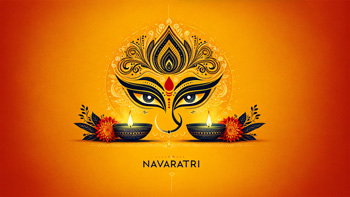Navaratri, a significant Hindu festival, celebrated with great enthusiasm across various parts of India and the world, is a vibrant embodiment of culture, tradition, and devotion. Spanning over nine nights and ten days, Navaratri honors the divine feminine, primarily Goddess Durga, in her various forms. This festival, rich in ritual and symbolism, showcases the diversity and spiritual depth of Hinduism, bringing together communities in a celebration of faith, dance, music, and traditional customs.
Historical and Cultural Significance
The origins of Navaratri are rooted in ancient Hindu scriptures, with various legends associated with it. One popular belief is that the festival commemorates the battle between Goddess Durga and the demon Mahishasura, symbolizing the victory of good over evil. Each day of Navaratri is dedicated to a different form of Goddess Durga, celebrating her power, valor, and benevolence. The festival's cultural significance extends beyond religious observance, symbolizing the empowerment of women and the respect for feminine power in Hindu culture.
Celebrations Across India
Navaratri is celebrated uniquely in different parts of India, reflecting the country's cultural diversity. In West Bengal, it is celebrated as Durga Puja, a spectacular event marked by the creation of elaborate pandals (temporary structures) housing beautifully crafted idols of Goddess Durga. Gujarat is known for its Garba and Dandiya Raas dance festivals, where people dressed in colorful traditional attire dance in circles, celebrating the festival with joy and fervor. In Southern India, especially in Tamil Nadu, Karnataka, and Andhra Pradesh, the festival is celebrated as Golu, where dolls are displayed on stepped platforms. The variation in celebrations across regions highlights the diverse yet unified spirit of Navaratri.
Rituals and Practices
Navaratri is marked by a series of rituals and practices that are steeped in symbolic meaning. Fasting is a common practice, where devotees abstain from certain foods to purify the body and mind. Special prayers and Aartis (worship rituals) are conducted in homes and temples, and offerings are made to the Goddess. The recitation of sacred texts like the Durga Saptashati, a collection of 700 verses in praise of Goddess Durga, is an integral part of the worship. The festival also emphasizes the importance of inviting and honoring women, as a respect to the feminine divine power.
Navaratri's Global Reach
With the Indian diaspora spread across the globe, Navaratri has transcended national boundaries, becoming a global celebration. In countries like the USA, Canada, the UK, and Australia, Indian communities organize cultural programs, dance performances, and religious gatherings, keeping the tradition alive. These celebrations not only serve to preserve cultural heritage but also provide a means for cultural exchange, introducing people from different backgrounds to the richness of Indian festivals and traditions.
The Culmination: Vijayadashami or Dussehra
Navaratri culminates in Vijayadashami or Dussehra, a day that symbolizes the triumph of good over evil. In many parts of India, effigies of the demon Ravana are burnt to mark Lord Rama's victory over him, as narrated in the epic Ramayana. This act is symbolic of the destruction of evil and the restoration of righteousness. In other regions, Vijayadashami is celebrated as the day when Goddess Durga defeated Mahishasura, emphasizing the theme of the power of good to vanquish evil.
Navaratri and Its Social Impact
Navaratri is not just a religious festival; it has a significant social dimension as well. It serves as a platform for social gatherings, cultural exchanges, and community bonding. The festival also plays a role in the preservation and promotion of traditional arts and crafts, as artisans create idols, decorations, and attire specifically for this occasion. Additionally, Navaratri promotes values like discipline, devotion, and respect for women, which are integral to the social fabric of India.
Navaratri, with its blend of spirituality, tradition, and cultural richness, offers a unique experience to its participants. It's a festival that not only honors the divine feminine but also celebrates the spirit of humanity, unity, and the eternal fight of good over evil. The continuous popularity and relevance of Navaratri demonstrate the enduring nature of these cultural practices and their ability to adapt and resonate with people across generations and geographies.
